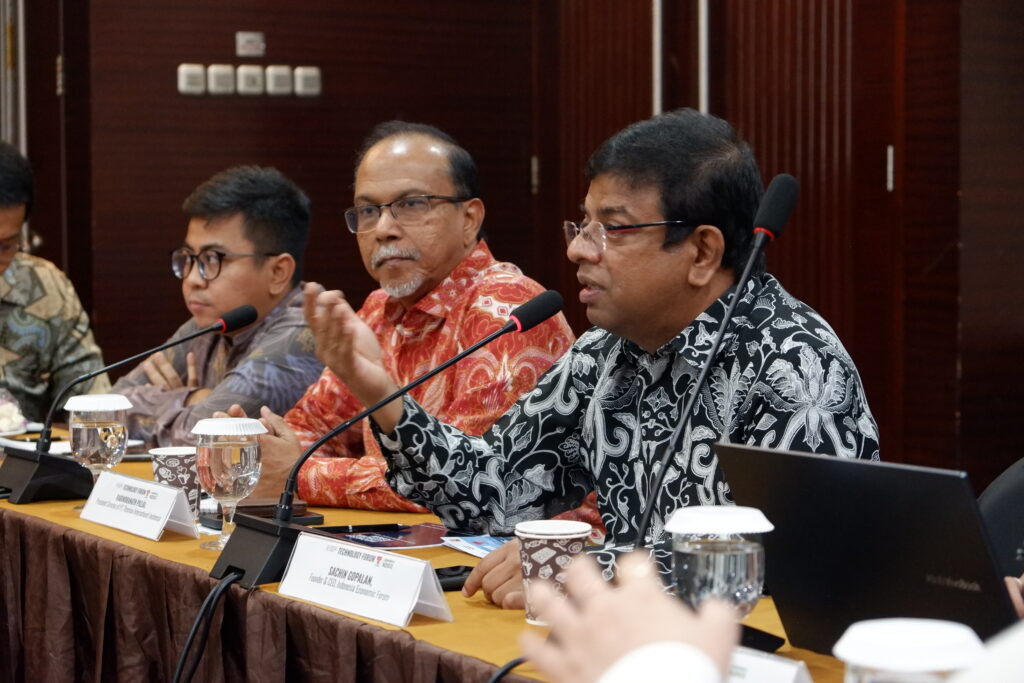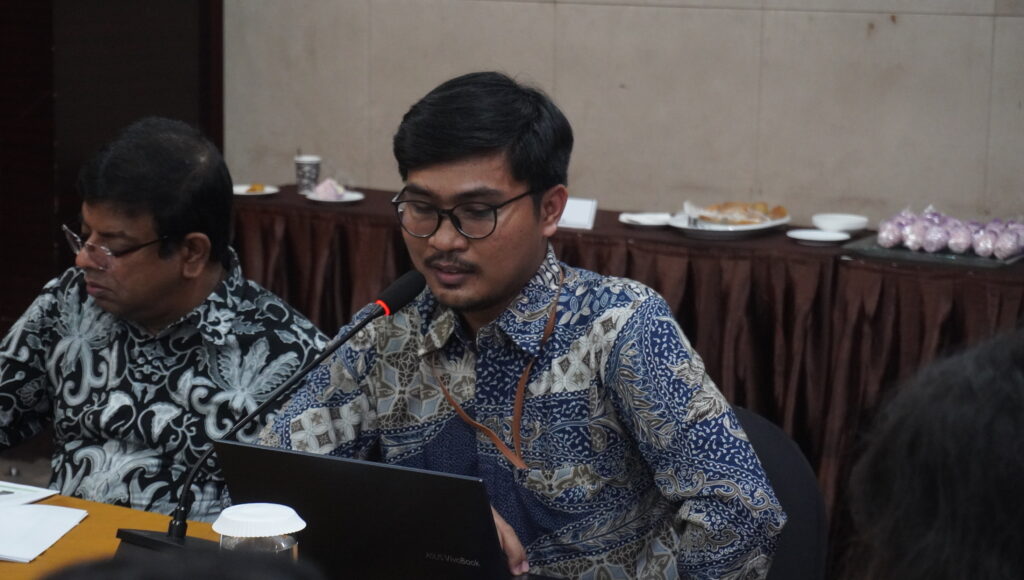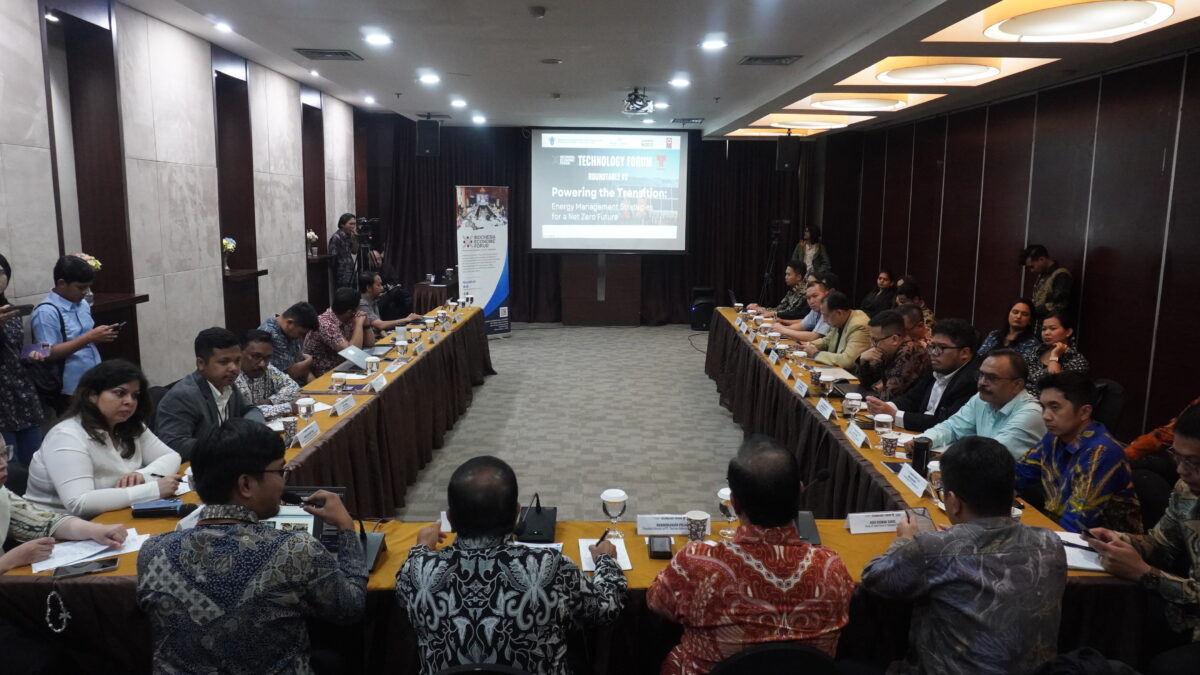Cikarang, Indonesia – 19 May, 2025 The second edition of the Tech Forum convened key stakeholders from industry, government, and the technology sector to accelerate Indonesia’s transition toward net zero emissions. Hosted in collaboration with the Net Zero Industrial Cluster Community (NZICC), the event focused on practical steps, policy alignment, and technological solutions necessary to decarbonize industrial operations and scale sustainable energy solutions. The forum opened with a keynote emphasizing the correlation between energy consumption and economic growth. “If energy consumption grows by 12%, the economy can aim for an 8% GDP growth target,” stated Sachin Gopalan, Founder & CEO, Indonesia Economic Forum as the moderator, highlighting the need for clean energy expansion to fuel Indonesia’s Vision 2045 goals.

Indonesia Economic Forum/Rafi Fadhillah
Emphasizing the need for responsible industrial growth, the roundtable highlighted that energy consumption must rise in tandem with industry, but in a way that supports net zero targets. “Energy consumption goes to 12% growth, automatically the whole economy will lift, going towards 8% growth. So, that is your KTRA. How can we make sure energy consumption goes to 12% growth? Now, energy cannot grow if industry does not grow, right? Because the largest consumption will not come from private usage, it will come from industrial usage”, stated the moderator. “So, the technology forum is trying to identify those technologies which will result in high growth of the economy. Because there are many sectors of manufacturing or industrialization which does not contribute to the growth in the same way. So, we want to prioritize certain group of technologies which will help this,” The discussion underscored the critical role of industrial energy use, not household consumption, in driving national growth and emphasized that the transition must leverage clean, smart technologies.
The roundtable, conducted in a Focus Group Discussion (FGD) format, served two primary goals: to unpack the practical realities of energy management in industrial and infrastructure sectors, and to outline clear, actionable steps to be implemented over the next 6–12 months. Participants examined how to align industrial energy growth with Indonesia’s climate goals, stressing that not all industrial activities contribute equally to GDP. Prioritizing high-impact sectors and the right technologies was seen as essential to reaching national Key Performance Indicators (KPIs). A major highlight of the session was the involvement of Thermax, one of India’s global leaders in energy transition technologies. Represented by Samina Khalid, Global Head-Corporate Communications, Thermax Limited, Rabindranath Pillai, President Director, PT. Thermax International Indonesia, and Sujit Vargis, Head-Sales and Marketing, PT Thermax International Indonesia, Thermax shared its expertise in helping industries transition to cleaner, more efficient energy systems. Rabindranath Pillai presented key technologies and success stories, while Samina opened with insights into scalable net zero strategies.
The roundtable also featured the Jababeka Group’s Net Zero Industrial Cluster Center (NZICC), represented by Regi Risman Sandi, Head of Task Force, Jababeka NZICC and his team, who introduced their efforts to build Indonesia’s first net zero-ready industrial ecosystems through innovation and public–private collaboration. Government participation was led by Ibnu Chasyim Affandi Napitupulu, Energy Utilization Analyst from the provincial Energy and Mineral Resources (ESDM), who delivered an opening statement on the local government’s priorities in compliance, community building, and energy reform. His remarks underscored the critical role of regional leadership in supporting national ambitions and creating a network of champions dedicated to net zero practices.
Government Collaboration: Regulatory Frameworks and Provincial Strategy
The session also brought to light key policy directions and technology strategies from West Java’s provincial government. Ibnu Chasyim Affandi Napitupulu, representing the Energy Division of the Energy and Mineral Resources (ESDM) Office of West Java, explained: “In West Java province, we have regional regulation number 13, 2024 about the regional long term development plan. And in the, the government has a green economy index and have a total 50 indicators including environmental, economic and social for green development.” He further elaborated, “By 2023, the renewable energy portion in West Java achieve 24.36%. In past three years, the renewable energy portion has been exceeded from the target. The new target we have calculated for the renewable mix target in the 2050 is 70.29%.”

Indonesia Economic Forum/Rafi Fadhillah
Ibnu, shared the province’s updated vision: increasing the renewable energy mix to over 70% by 2050, and introducing enforceable measures through presidential and ministerial regulations. He outlined policy shifts enabling provincial authorities to take a more active role in managing biomass, biogas, and other renewables.
“We are currently revising the 2019 regional energy plan to reflect these updates,” Ibnu Chasyim Affandi Napitupulu, representing the Energy Division of the Energy and Mineral Resources (ESDM) Office of West Java stated. “Input from industry is welcome as we develop a roadmap that will work not just on paper, but on the ground.”
West Java’s Green Economy Index, incorporating 50 indicators across environment, economy, and society, is being used as a benchmark to align development plans with climate goals.
In detailing the province’s sectoral strategies, he stated, “What we have proposed the policy and the strategy in the annex of the updating rate for industrial sector are the first one is fuel switching, increase the electricity use, coal reduction and gas and hydrogen use. The second is energy efficiency, the equipment with the potential to reduce energy consumption by 50% until 60%.” He added, “We put to in low temperature processes industries such as food and beverage, textile and leather, electronic devices assuming to achieve 55% electrification by 2026. The next is hydrogen as a gas substitute, green hydrogen to replace the natural gas for high temperature heating processes starting from 2041.” He concluded with a focus on high-impact technologies: “The fifth is biomass substitution replaces fossil fuels for high temperature heating processes especially in the cement industry but it also applied in other subsector with smaller quantities. And then the carbon capture storage technology for the cement and steel industry starting from 2036.”
Jababeka NZICC: Leading by Example with Industrial Decarbonization
Regi Risman Sandi, Head of Task Force, Jababeka NZICC, representing Jababeka NZICC, introduced the cluster’s bold goal of achieving net zero by 2050—a full decade ahead of the national target. Established during the B20 Summit in 2022 and supported by global anchors such as L’Oréal and Hitachi, NZICC currently comprises 90 member companies and aims to onboard 100 companies by 2026.
Indonesia Economic Forum/Rafi Fadhillah
Jababeka’s dual decarbonization approach includes:
- Core Decarbonization, where tenants implement solutions under their direct control (e.g., energy audits, renewable integration), and
- Systemic Decarbonization, where Jababeka facilitates cross-industry collaboration, solution matchmaking, and knowledge transfer.
Thermax Showcases Scalable Energy Technologies and Solutions
India-based energy and environment technology leader Thermax Ltd. played a central role in the forum by presenting real-world clean energy applications across Indonesian factories. With over 60 years of experience, Thermax specializes in energy efficiency, biomass boilers, waste-to-energy systems, green hydrogen, and carbon capture technologies.
Indonesia Economic Forum/Rafi Fadhillah
“We see ourselves as a trusted partner in our clients’ energy transition journeys,” said Rabindranath Pillai, President Director at Thermax International Indonesia. “From boilers powered by coconut shells to zero-liquid-discharge water systems, our goal is to decarbonize operations at every level.”
Thermax’s Indonesian footprint includes a manufacturing facility in Cilegon and over 95% of its local workforce is Indonesian. They presented multiple case studies including:
- Absorption chillers powered by biomass waste in the coconut processing industry,
- Electrostatic precipitators that reduce emissions to below 50 mg/Nm³—far exceeding regulatory requirements,
- Closed-loop cooling towers saving over 10,000 liters of water per hour, and
- Zero-liquid discharge systems for chemical plants in Jakarta.
PLN Confirms Commitment to Renewable Energy Investment
Representatives from PLN, Indonesia’s state electricity utility, shared updates on the nation’s RUPTL energy plan, stating that all new generation capacity through 2040 will be from renewable sources. They also reaffirmed their support for tools like Renewable Energy Certificates (RECs) and carbon credit frameworks, designed to allow industries to offset their footprints through clean energy usage on the national grid.
Indonesia Economic Forum/Rafi Fadhillah
“The REC system in Indonesia is transparent, auditable, and scalable,” PLN noted, acknowledging their collaboration with the Ministry of Energy and Mineral Resources (ESDM) and BAPPEBTI to create a functional carbon market.
Urgency and Accountability: Industry Demands Real Action
One of the most animated discussions centered on the balance between encouragement and enforcement. Several industry voices, including veteran consultant Naresh Makhijani, CEO, OTI Indonesia, advocated for a more urgent and accountable approach.
Indonesia Economic Forum/Rafi Fadhillah
“Many companies are at risk of being left behind. We need to stop hiding behind ‘awareness’ and start driving compliance with real consequences,” Naresh said. “If factories want to export, they must meet global carbon standards. It’s that simple.”
His remarks resonated with many participants, prompting a candid discussion about the feasibility of carbon taxes, performance-linked incentives, and the role of community pressure in spurring adoption.
Next Steps: A Working Plan for Implementation
The forum concluded with a strong commitment from NZICC and its partners to convert discussions into action. Planned initiatives include:
- A bi-monthly Tech Forum series, bringing together policymakers, solution providers, and factory managers,
- A net zero champions program, identifying 100 factories committed to transformation,
- Structured working groups for energy audits, compliance roadmaps, and solution matchmaking..
About Tech Forum
The Technology Forum on Indonesia’s economic growth is a platform that brings together key stakeholders, including key Government Ministries, Industrial park developers, and Industrial technology providers. The forum focuses on leveraging advanced technologies to drive the country’s industrialization and economic transformation. It explores how industrial parks can serve as hubs for innovation and manufacturing, fostering collaboration between the public and private sectors to accelerate Indonesia’s economic growth.
The forum aligns with Indonesia’s vision for sustainable development, innovation-driven industries, and the realization of an 8% Indonesia economic growth target. Through digital transformation, smart manufacturing, and green technologies, the country aims to enhance its global competitiveness and position itself as a leader in high-value industries.
For partnerships, interviews, or media inquiries, please contact:
Indonesia Economic Forum (Media Partner)
📧 polikarpus@indonesiaeconomicforum.com
📞 +62-878-532-98-306


